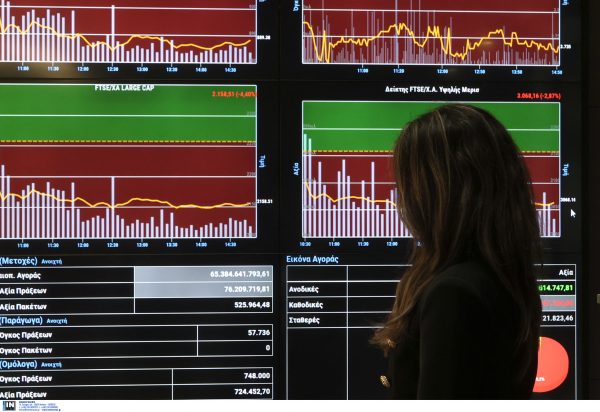
Inflation in Greece is accelerating in 2022, according to the spring forecasts of the Commission, which were recently published. At the same time, the European Commission is lowering the bar for growth this year.
In particular, growth of 3.5% in 2022 and 3.1% in 2023, after a strong growth of 8.3% in 2021, “sees” the European Commission for Greece in its spring economic forecasts that it published today. The Commission revises downwards its forecasts for the growth of the Greek economy in 2022 and 2023, compared to those of February (4.9% was the forecast for 2022 and 3.5% for 2023).
Read also: FinMin on Commission forecasts: The Greek economy is showing resilience
In its report on Greece, the Commission states: “After a rapid recovery from the pandemic and a promising start in the first months of the year, the Russian offensive against Ukraine has blurred the prospects for Greece. Growth is expected to decline but remain stable, mainly due to the full recovery of tourism by the end of the forecast horizon (2023)”. It is also pointed out that high inflation is expected to burden real disposable household income, but this is partly mitigated by government support measures. The emergency budget measures are due to expire in 2022 and a primary surplus is expected for 2023.
Uncertainty and growth
In particular, the Commission states that despite the prolonged uncertainty due to the successive waves of the pandemic, the Greek economy recovered rapidly in 2021, almost fully offsetting the sharp economic downturn by 2020. Greece’s real GDP grew by 8.3% in 2021, reflecting the best of the expected tourist season, while private consumption recovered almost completely. Growth also came from a significant boost in private investment, while exports of goods continued to rise as the country benefited from the recovery in the EU and other trading partners.
According to the Commission, the turmoil in global energy markets is expected to increase domestic inflationary pressures and burden real disposable household income. However, government support measures, minimum wage increases and the savings that have accumulated during the pandemic are expected to partially mitigate the negative impact on private consumption. “Increased risk aversion, along with increased supply bottlenecks, may delay the launch of new investment projects, but the economy will also benefit from the development of RRF-funded projects,” the Commission noted.
In addition, export growth is projected to remain stable due to the recovery of tourism, which is expected to remain resilient given the limited share of tourists from Russia, Ukraine and Belarus in total arrivals. However, the increase in exports of goods is expected to slow down compared to previous estimates in view of the projected slowdown in the EU and the global economy as a whole.
Overall, real GDP is projected to increase by 3.5% in 2022. Growth in 2023 is expected to remain high, at 3.1%, due to the gradual recovery of real disposable income and the projected return of tourism to pre-pandemic level.
Inflation peaked in the second quarter
At the same time, according to the Commission, inflation in Greece is expected to peak in the second quarter of 2022 and remain high thereafter, before declining in 2023. Rising international oil and natural gas prices are the main driver, while rising core input costs, such as fertilizers and transport, affect food prices. Total inflation is projected to reach 6.3% in 2022 and 1.9% in 2023.
“Russia’s military offensive against Ukraine has increased the downward risks to the Greek economy, while the prospects depend on the technical assumptions of the forecast. Estimates of household spending prospects and investment dynamics are particularly sensitive to these assumptions.”
Uncertainty also affects the tourist season, as the actual disposable incomes of domestic and foreign tourists may decline due to inflation. Upwards, the strong performance in the exports of goods in the previous period of the increased disturbances on the supply side indicate some resilience of the export companies of Greece, a fact that could lead to stronger export performance than currently expected.
Fiscal risks remain
Government debt fell to 193% of GDP due to strong nominal GDP growth. It is expected to decline further to 186% of GDP in 2022 and to around 180% in 2023, supported by nominal GDP growth in both years and the primary surplus in 2023.
Concluding, the Commission report emphasizes that “despite the better-than-expected outcome of 2021, significant fiscal risks remain”. They are mainly related to the possible activation of state guarantees issued under the support measures, the court cases against the real estate company (ETAD) and the pending decision of the Council of State for the retroactive compensation for cuts in the supplementary pensions and seasonal bonuses. Upwards, corporate earnings profitability may continue to exceed expectations, as happened for the 2021 fiscal result.
Return of primary surpluses
The general government deficit in Greece reached 7.4% in 2021, a fact that mainly reflects the emergency and support measures that still apply to the pandemic. This result is, according to the Commission, better than expected earlier and is due to the rapid recovery of personal and corporate incomes.
As growth continues and some of the pandemic-related measures have already been scrapped, the deficit is expected to fall to 4.3% of GDP in 2022, although it is also expected to be affected by interim measures taken in response to high prices. energy.
The general government deficit is expected to fall to 1% of GDP in 2023, bringing the primary balance to a surplus of 1.3% of GDP. This projected reduction presupposes that most of the pandemic-related measures, as well as those implemented to mitigate the impact of high energy prices, will be phased out. The Commission also notes that the factors envisaged for the extension of the two development-friendly tax cuts planned by the Authorities, which are based on measures originally enacted in 2021 and 2022 to alleviate the effects of the pandemic, were about to expire. at the end of this year.
Job creation continues
Beyond that, with regard to employment, the Commission emphasizes that job creation continues in the midst of high inflation. Job creation showed strong growth in the second half of 2021 due to increased employment in agriculture and manufacturing. It is expected to continue in 2022, despite the overall slowdown in economic activity this year.
It is also noted that the minimum wage increased by 7.5% in May 2022, after a modest increase of 2% in January 2022. “This is likely to support the increase in nominal wages in the second half of the year, given “Almost a third of all workers in the country receive a minimum wage,” the commission estimates.
Disposable income
In terms of disposable household income, the Commission considers that there will be no serious losses due to the 7.5% increase in the minimum wage in May and 9% since the beginning of the year and the continuing increase in employment in industry and agriculture. In combination with the accumulated savings during the months of the pandemic, it estimates that household income will be stable in the second half of the year.
The suspension of the special solidarity contribution for 2022 but also the reduction of the insurance contributions by 3%, which were implemented as measures of support against the coronavirus in 2021 and are repeated this year are considered positive for the support of disposable income.
Latest News

Economist: Greece Included in the Best Performing Economies in 2024
Meanwhile, Northern European countries disappoint, with sluggish performances from the United Kingdom and Germany.

EasyJet Expands Its Routes from Athens
The airline’s two new routes will be to London Luton and Alicante and they will commence in summer 2025.

Capital Link Forum Highlights Greece’s Economic Resurgence; Honors BoG Gov Stournaras
Capital Link Hellenic Leadership Award recipient, Bank of Greece Gov. Yannis Stournaras, an ex-FinMin, was lauded for his pivotal role during Greece’s economic recovery

Tourist Spending in Greece Up by 14%, Visa Card Analysis Shows
Greece’s capital Athens emerged as the most popular destination, recording a 17% increase in transactions with Visa cards, surpassing even the cosmopolitan island of Mykonos.

Inflation in Greece Unchanged at 2.4% in Nov. 2024
The general consumer price index (CPI) posted a 0.4% decrease in November compared to the previous month

2024 Christmas Holidays: Extended Shop Hours Schedule
The 2024 Christmas Holidays extended shop hours schedule commences on Thursday, December 12 and runs until the end of the year.

ELSTAT: Seasonally Adjusted Unemployment Down in October
The number of employed individuals reached 4,284,694, an increase of 67,723 compared to October 2023 (+1.6%) and 22,002 compared to September 2024 (+0.5%).

Greek PM’s Chief Economic Adviser Resigns
In the post on his Facebook page, Patelis did not disclose the reasons that led him to step down.

“Masdar Invests in the people of Greece and in the vision of TERNA ENERGY”
Four messages from the CEO of Masdar, the Arab renewable energy giant, after its acquisition of 70% of TERNA ENERGY

Lloyd’s List Greek Shipping Awards 2024: Honors for leading companies and personalities in the Greek shipping sector
20 awards presented at the 21st annual Lloyd's List Greek Shipping Awards










































 Αριθμός Πιστοποίησης Μ.Η.Τ.232433
Αριθμός Πιστοποίησης Μ.Η.Τ.232433